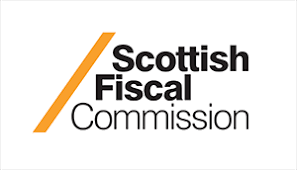Scottish Fiscal Commission warns increased tax gap could put high earners off Scotland, but ups economics forecast

Finance Secretary Derek Mackay’s decision to freeze the threshold for the higher rate of income tax at £43,430 with the effect of widening the so-called “tax gap” with the rest of the UK, could put some people off coming to work in Scotland, the Scottish Fiscal Commission has said.
While Mr Mackay said his decision to hold the tax band would raise an estimated additional £68 million, the threshold will increase to £50,000 across the rest of the UK from next April, which will widen the gap for higher rate taxpayers, who are taxed at 41p in Scotland but at 40p elsewhere.
It means people earning £50,000 in Scotland will pay £1,500 more income tax than elsewhere in the UK, while someone earning £45,000 will pay £494 more a year in Scotland than they would in the rest of the UK, and anyone earning £100,000 will pay £2,044 more.
However, everyone earning under £27,000 in Scotland - about 55 per cent of all taxpayers - will pay less tax than they would elsewhere, but only by about £20 a year.
The Scottish Fiscal Commission, established by the Scottish Parliament to provide independent economic forecasts, with its members being appointed by Mr Mackay, said his decision this week could make people “think twice” about working in Scotland.
And they predicted it would also make others consider leaving Scotland or changing their residency status, and would have an impact on whether people go for a promotion or work more hours.
Commission chief executive John Ireland said the increasing gap for higher rate taxpayers “will affect where people choose to locate over time, both people thinking of coming to Scotland and people living in Scotland who can either leave Scotland or change their residency.
“We think it will knock off about £6m from income tax revenues.”
And Commission chairwoman, Dame Susan Rice warned of the tight labour market in Scotland and said people might “think twice about coming to Scotland for a job”.
While head of economy, income tax and VAT, David Stone, said: “If you are currently sat at £45,000 and facing a 53% marginal tax rate, you put student loan repayments and pension contributions on that as well, you could be taking home as little as 30p in the pound.
“So the incentive to go for a promotion, work more hours it is going to have an effect in the income range and we’ve tried to capture that in our behavioural costing.”
Meanwhile, the Commission’s official economic forecasts, published in the wake of this week’s Budget, show its economic outlook for Scotland in 2018 and 2019 has improved.
Yesterday the Commission said it forecasts economic growth of 1.4 percent in 2018 and 1.2 percent in 2019, reflecting stronger recent economic performance, a more positive prospect for earnings over the next few years and the fiscal expansion announced in the UK Autumn Budget.
This is an increase of 0.7 and 0.4 percentage points respectively, when compared with the Commission’s May forecasts.
The Commission expects annual economic growth from 2020 onwards to settle back to around 1 per cent. This reflects low productivity growth compared with trends before the 2008 financial crisis.
Chair of the Fiscal Commission, Dame Susan Rice, said: “We have seen economic indicators picking up recently and we believe that the economy will grow more quickly in 2018 and 2019. There is little change in the longer term when we expect the economic prospects for Scotland to remain subdued.”
“Brexit is a major uncertainty in this forecast. Our central assumption remains that of a relatively orderly exit from the EU.
“The Scottish Government’s budget is increasingly determined by devolved tax receipts and social security spending. This means that the Commission’s tax and social security forecasts are now playing a greater role in the budget arithmetic.
“The Commission forecasts that £15.2 billion of the Scottish Budget will be raised by devolved taxes in 2019-20. Income tax raises the most revenue, forecast to be £11.7 billion next financial year. Of this, the changes in Scottish Government policy announced in today’s Budget raise an additional £68 million.
“Our fiscal forecasts also include the effect of an increased Additional Dwelling Supplement and changes to the non-residential tax which add £39 million to our 2019-20 estimate of Land and Buildings Transaction Tax receipts.
“The number of devolved social security benefits has increased with plans for new benefits to be devolved next year. Total social security spending is forecast to be £458 million in 2019-20. The Scottish Government has reformed these benefits, extending entitlements, making it easier to apply and increasing payment amounts. We estimate that these new and expanded social security plans will cost £90 million more than the funding received for these benefits.”




